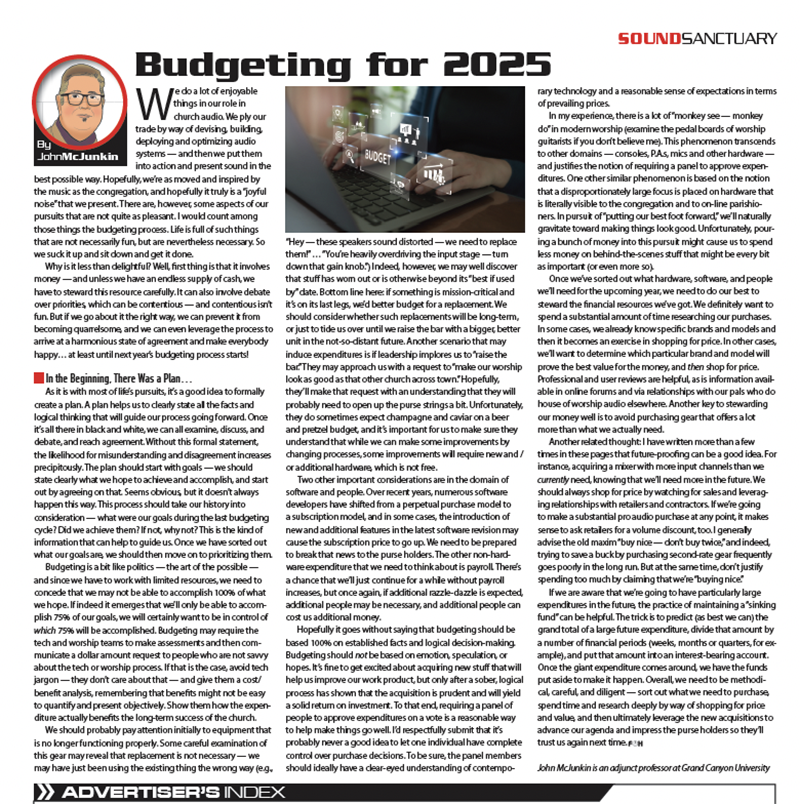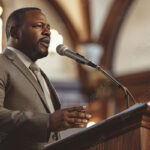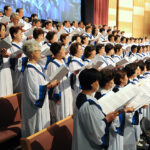
As the pithy old aphorism tells us, when you fail to plan, you are planning to fail, and failure to plan spawns all kinds of problems. Over-planning can occur; however, over-planning creates fewer difficulties than under-planning. Plowing forward without a plan is like driving on the freeway blindfolded. So what kind of planning do we need? Some things are obvious and present themselves, but other things may not be as apparent. Hopefully you’ll find one or two of those things as you read here, or at least these words may help result in a more effective planning process for the upcoming year. Advance annual planning can be divided into key domains: humans, happenings, hardware and holy days/holidays.
Humans
The most important asset in any church’s worship process is human beings — people who perform music and project lyrics and provide creative lighting and turn knobs and move faders to make it all sound good. People make it all happen, and even as we automate a few parts of the process, we will always need people. The care and feeding of people is vastly more complex and important than the care and feeding of technology, and will require a larger share of planning time than the other segments — probably more than the others combined. One key factor is the acquisition of human assets. It’s a matter of when — rather than if — people will leave their positions. We all move on eventually, creating a need for acquiring replacements. And, of course, as churches grow, we simply need to add more people to the mix.
It’s more common that churches behave reactively (rather than proactively) in relation to recruitment. Sometimes it’s necessary, but if not, it’s almost always preferable to be proactive. In this case, I’d suggest planning a formal recruitment drive or two during the year. Having more people than necessary for the tech teams is a pretty rare problem. So why not vigorously and actively seek to build the team up to numbers sufficient to handle lengthy rotation cycles in order to help reduce burnout? Having more than enough people at facilitates allows experimentation with the cycle to arrive at intervals that are not too long or short.
If recruitment is formalized and scheduled, then training will follow suit, with new team members rotating into the mix with each new recruitment cycle. The beauty of this plan is that recruitment, auditions, training (both in-house and via conference attendance) can each be scheduled bearing the others in mind. Performance evaluations should also be scheduled in a similar way. Obviously, there will occasions where adding personnel must be handled on an ad-hoc basis, but these needs will be less common if an ongoing, formalized effort goes into building up team numbers. Of course, planned and expected changes in personnel can (and should be) taken into consideration as part of the planning process.
Happenings
We need to constantly look forward and develop goals and plans to improve and move forward. We should plan meetings during which we’ll focus exclusively on the establishment of goals, and then additional meetings where we focus exclusively on creating strategies and plans (since goals themselves are not plans, and plans are necessary to accomplish our goals). Think of it as “planning to engage in planning.” Also, there will be future changes for which we can plan and be prepared. For instance, if we know the church will be either moving into a new facility or building a new facility on the same grounds, we can plan and be prepared to make the adjustments necessary to transition smoothly and successfully. This is important even for lesser changes, such as instance shifts in leadership. Honest, periodic evaluation of progress in every area of performance is important, so adjustments can be made to accomplish stated goals. And scheduling of future planning must be a focus as well — for instance, planning the meetings during which next year’s Christmas planning will happen … “scheduling the scheduling,” if you will.
The Gear Question
It’s not a question of if — but when — equipment will fail and require repair or replacement. Personally, I’d rather replace a power amp when it reaches 75 percent of its expected life instead of pushing it right to the bitter end and suffering the consequences when it decides to give up the ghost two minutes prior to the main Sunday service. By being aware of how long equipment should last and by assessing it periodically, we can avoid having equipment fail at inopportune moments. This can be accomplished by planning an equipment replacement schedule and budgeting for it in advance. Care must be taken that a gear replacement budget is not robbed for other purposes — sometimes non-tech types fail to see the benefit of such funding and choose to abscond with money from those sources. It’s also a very good idea to plan an annual event when technology can be inventoried, assessed, cleaned, repaired, updated and general de-cluttering and organization is accomplished. This will produce important intelligence that will inform decision-making in regard to technology in the immediate future. It can also produce hand-me-down technology that can be used to improve the children’s ministry, for example.
Holy Days & Holidays
Finally, we examine planning for all the expected annual events — things like Easter, Christmas, and so on. This is the obvious stuff for which most teams are probably already planning sufficiently. And while it’s not plausible to put an Easter-sized effort into every Sunday service, an attempt to at least try to improve planning and preparation for “regular” services up to holy day levels will result in noticeable and desirable improvements. Also, the summer season will invariably see more team members blocking days out for vacation, and here, additional planning will help prevent scheduling disasters. As with everything else in life, advance planning is just a good idea, and it can yield excellent results — so plan on planning for 2020 and beyond.
John McJunkin is the chief engineer and staff producer in the studio at Grand Canyon University.



